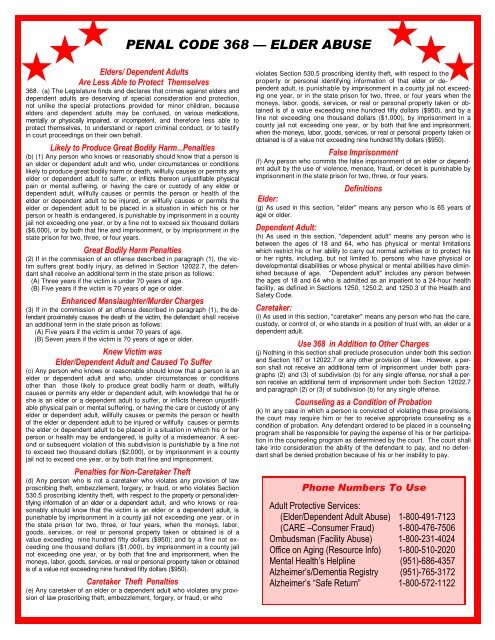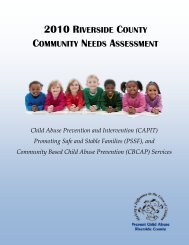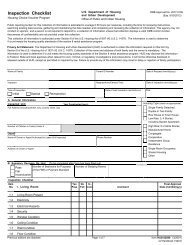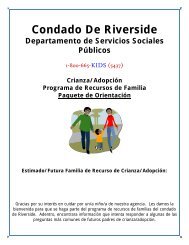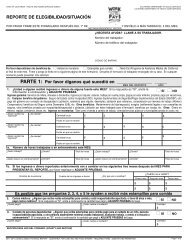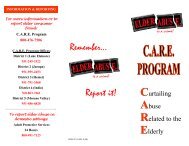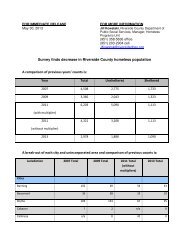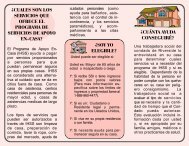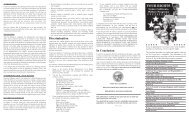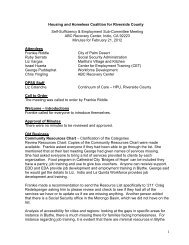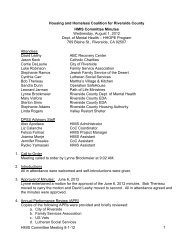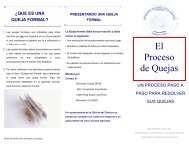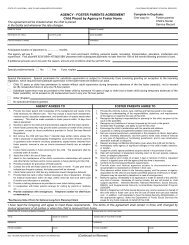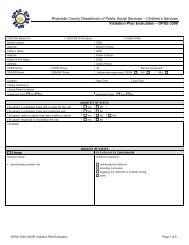Sample Penal Code 368 Information Flyer - Riverside County ...
Sample Penal Code 368 Information Flyer - Riverside County ...
Sample Penal Code 368 Information Flyer - Riverside County ...
You also want an ePaper? Increase the reach of your titles
YUMPU automatically turns print PDFs into web optimized ePapers that Google loves.
PENAL CODE <strong>368</strong> — ELDER ABUSE<br />
Elders/ Dependent Adults<br />
Are Less Able to Protect Themselves<br />
<strong>368</strong>. (a) The Legislature finds and declares that crimes against elders and<br />
dependent adults are deserving of special consideration and protection,<br />
not unlike the special protections provided for minor children, because<br />
elders and dependent adults may be confused, on various medications,<br />
mentally or physically impaired, or incompetent, and therefore less able to<br />
protect themselves, to understand or report criminal conduct, or to testify<br />
in court proceedings on their own behalf.<br />
Likely to Produce Great Bodily Harm...<strong>Penal</strong>ties<br />
(b) (1) Any person who knows or reasonably should know that a person is<br />
an elder or dependent adult and who, under circumstances or conditions<br />
likely to produce great bodily harm or death, willfully causes or permits any<br />
elder or dependent adult to suffer, or inflicts thereon unjustifiable physical<br />
pain or mental suffering, or having the care or custody of any elder or<br />
dependent adult, willfully causes or permits the person or health of the<br />
elder or dependent adult to be injured, or willfully causes or permits the<br />
elder or dependent adult to be placed in a situation in which his or her<br />
person or health is endangered, is punishable by imprisonment in a county<br />
jail not exceeding one year, or by a fine not to exceed six thousand dollars<br />
($6,000), or by both that fine and imprisonment, or by imprisonment in the<br />
state prison for two, three, or four years.<br />
Great Bodily Harm <strong>Penal</strong>ties<br />
(2) If in the commission of an offense described in paragraph (1), the victim<br />
suffers great bodily injury, as defined in Section 12022.7, the defendant<br />
shall receive an additional term in the state prison as follows:<br />
(A) Three years if the victim is under 70 years of age.<br />
(B) Five years if the victim is 70 years of age or older.<br />
Enhanced Manslaughter/Murder Charges<br />
(3) If in the commission of an offense described in paragraph (1), the defendant<br />
proximately causes the death of the victim, the defendant shall receive<br />
an additional term in the state prison as follows:<br />
(A) Five years if the victim is under 70 years of age.<br />
(B) Seven years if the victim is 70 years of age or older.<br />
Knew Victim was<br />
Elder/Dependent Adult and Caused To Suffer<br />
(c) Any person who knows or reasonable should know that a person is an<br />
elder or dependent adult and who, under circumstances or conditions<br />
other than those likely to produce great bodily harm or death, willfully<br />
causes or permits any elder or dependent adult, with knowledge that he or<br />
she is an elder or a dependent adult to suffer, or inflicts thereon unjustifiable<br />
physical pain or mental suffering, or having the care or custody of any<br />
elder or dependent adult, willfully causes or permits the person or health<br />
of the elder or dependent adult to be injured or willfully causes or permits<br />
the elder or dependent adult to be placed in a situation in which his or her<br />
person or health may be endangered, is guilty of a misdemeanor. A second<br />
or subsequent violation of this subdivision is punishable by a fine not<br />
to exceed two thousand dollars ($2,000), or by imprisonment in a county<br />
jail not to exceed one year, or by both that fine and imprisonment.<br />
<strong>Penal</strong>ties for Non-Caretaker Theft<br />
(d) Any person who is not a caretaker who violates any provision of law<br />
proscribing theft, embezzlement, forgery, or fraud, or who violates Section<br />
530.5 proscribing identity theft, with respect to the property or personal identifying<br />
information of an elder or a dependent adult, and who knows or reasonably<br />
should know that the victim is an elder or a dependent adult, is<br />
punishable by imprisonment in a county jail not exceeding one year, or in<br />
the state prison for two, three, or four years, when the moneys, labor,<br />
goods, services, or real or personal property taken or obtained is of a<br />
value exceeding nine hundred fifty dollars ($950); and by a fine not exceeding<br />
one thousand dollars ($1,000), by imprisonment in a county jail<br />
not exceeding one year, or by both that fine and imprisonment, when the<br />
moneys, labor, goods, services, or real or personal property taken or obtained<br />
is of a value not exceeding nine hundred fifty dollars ($950).<br />
Caretaker Theft <strong>Penal</strong>ties<br />
(e) Any caretaker of an elder or a dependent adult who violates any provision<br />
of law proscribing theft, embezzlement, forgery, or fraud, or who<br />
violates Section 530.5 proscribing identity theft, with respect to the<br />
property or personal identifying information of that elder or dependent<br />
adult, is punishable by imprisonment in a county jail not exceeding<br />
one year, or in the state prison for two, three, or four years when the<br />
moneys, labor, goods, services, or real or personal property taken or obtained<br />
is of a value exceeding nine hundred fifty dollars ($950), and by a<br />
fine not exceeding one thousand dollars ($1,000), by imprisonment in a<br />
county jail not exceeding one year, or by both that fine and imprisonment,<br />
when the moneys, labor, goods, services, or real or personal property taken or<br />
obtained is of a value not exceeding nine hundred fifty dollars ($950).<br />
False Imprisonment<br />
(f) Any person who commits the false imprisonment of an elder or dependent<br />
adult by the use of violence, menace, fraud, or deceit is punishable by<br />
imprisonment in the state prison for two, three, or four years.<br />
Definitions<br />
Elder:<br />
(g) As used in this section, "elder" means any person who is 65 years of<br />
age or older.<br />
Dependent Adult:<br />
(h) As used in this section, "dependent adult" means any person who is<br />
between the ages of 18 and 64, who has physical or mental limitations<br />
which restrict his or her ability to carry out normal activities or to protect his<br />
or her rights, including, but not limited to, persons who have physical or<br />
developmental disabilities or whose physical or mental abilities have diminished<br />
because of age. "Dependent adult" includes any person between<br />
the ages of 18 and 64 who is admitted as an inpatient to a 24-hour health<br />
facility, as defined in Sections 1250, 1250.2, and 1250.3 of the Health and<br />
Safety <strong>Code</strong>.<br />
Caretaker:<br />
(i) As used in this section, "caretaker" means any person who has the care,<br />
custody, or control of, or who stands in a position of trust with, an elder or a<br />
dependent adult.<br />
Use <strong>368</strong> in Addition to Other Charges<br />
(j) Nothing in this section shall preclude prosecution under both this section<br />
and Section 187 or 12022.7 or any other provision of law. However, a person<br />
shall not receive an additional term of imprisonment under both paragraphs<br />
(2) and (3) of subdivision (b) for any single offense, nor shall a person<br />
receive an additional term of imprisonment under both Section 12022.7<br />
and paragraph (2) or (3) of subdivision (b) for any single offense.<br />
Counseling as a Condition of Probation<br />
(k) In any case in which a person is convicted of violating these provisions,<br />
the court may require him or her to receive appropriate counseling as a<br />
condition of probation. Any defendant ordered to be placed in a counseling<br />
program shall be responsible for paying the expense of his or her participation<br />
in the counseling program as determined by the court. The court shall<br />
take into consideration the ability of the defendant to pay, and no defendant<br />
shall be denied probation because of his or her inability to pay.<br />
Phone Numbers To Use<br />
Adult Protective Services:<br />
(Elder/Dependent Adult Abuse) 1-800-491-7123<br />
(CARE –Consumer Fraud) 1-800-476-7506<br />
Ombudsman (Facility Abuse) 1-800-231-4024<br />
Office on Aging (Resource Info) 1-800-510-2020<br />
Mental Health’s Helpline (951)-686-4357<br />
Alzheimer’s/Dementia Registry (951)-765-3172<br />
Alzheimer’s “Safe Return” 1-800-572-1122
Elder and Dependent Adult Abuse<br />
*Red Flags*<br />
Physical Abuse:<br />
• Inadequately explained fractures, bruises,<br />
welts, cuts, sores, and burns<br />
• Pressure “Bed” sores<br />
• Bruise or burn patterns like those found with<br />
child abuse/ domestic abuse<br />
• Medications used to restrain victim<br />
Neglect (by self or others):<br />
• Lack of basic body hygiene<br />
• Lack of adequate food<br />
• Lack of medical aids (glasses, walker, teeth,<br />
hearing aid, needed medications)<br />
• Lack of clean, appropriate clothing<br />
• Demented victim left unsupervised<br />
• Bed bound victim left without care<br />
• Home cluttered, filthy, in disrepair, or having<br />
fire and safety hazards<br />
• Home lacking minimum equipment and<br />
facilities ( stove, refrigerator, heat, cooling,<br />
working plumbing and electricity)<br />
• Animal hoarding<br />
Financial Abuse:<br />
• Lack of amenities that victim could afford<br />
• Victim “voluntarily” giving inappropriate financial<br />
reimbursement for needed care and companionship.<br />
(This is criminal when victim is<br />
under undue influence.)<br />
• Caretaker has control of victim’s money but is<br />
failing to provide for victim’s needs.<br />
• Caretaker “living off” victim<br />
• Victim has signed property transfers, Power of<br />
Attorney, new will, etc. when unable to comprehend<br />
the transaction<br />
In financial abuse cases it is important to get<br />
social security numbers and banking information<br />
to conduct a complete investigation.<br />
Psychological Abuse:<br />
• Caretaker isolates victim – restricts visits,<br />
phone calls (doesn’t want to let you into home<br />
or speak to victim)<br />
• Caretaker is violent, aggressive, controlling,<br />
addicted, or uncaring<br />
The identity of the individual who reported<br />
the abuse to law enforcement is to be kept<br />
confidential, even from the victim.<br />
W&I <strong>Code</strong> 15633<br />
Law Enforcement Officers are<br />
MANDATED MANDATED REPORTERS<br />
REPORTERS<br />
of elder and dependent adult abuse.<br />
If you observe, are verbally informed, or have knowledge that leads<br />
you to reasonably suspect that an elder or dependent adult is being<br />
abused or neglected you must call:<br />
as soon as practically possible, but within 24 hours<br />
Adult Protective Services<br />
1-800-491-7123<br />
within 2 working days fax SOC 341 report form to (951) 358-3969<br />
or (951) 358-3979<br />
If Abuse occurs in facility,<br />
fax the SOC 341 to Ombudsman at (951) 686-1687.<br />
If you respond to situations involving an elder or a dependent adult<br />
(see definitions on the reverse) evaluate for the following types of<br />
possible abuse:<br />
Physical Abuse: The infliction of physical pain or bodily<br />
harm not limited to:<br />
Assault/Battery Sexual Abuse<br />
Constraint Isolation<br />
Abduction Abandonment<br />
Common Charges: 240, 242, 243(d), 245, <strong>368</strong>(b)(1), <strong>368</strong>(b)(2), <strong>368</strong>(b)(3), <strong>368</strong>(c), 166<br />
(a)(4), 166 (c)(1), 187, 206, 347, 261(a)(1), 289(a), 220, 243.4, 286, 288a<br />
Neglect (by others): Refusal or failure to fulfill care taking<br />
obligations, such as abandonment or isolation, denial of food, shelter,<br />
clothing, medical assistance or personal needs, or the withholding of<br />
necessary medication or assertive devices. Neglect can be intentional<br />
or unintentional.<br />
Common Charges: <strong>368</strong>(b)(1), <strong>368</strong>(b)(2), <strong>368</strong>(b)(3), <strong>368</strong>(c), 187, 192, 206<br />
Financial (Material): The illegal or improper exploitation<br />
of funds or other resources (stealing or misusing possessions, property,<br />
or money).<br />
Common Charges: 115, 182, <strong>368</strong>(d), <strong>368</strong>(e), 470, 484-487, 496<br />
Psychological/Emotional Abuse: The infliction<br />
of mental anguish (threatening, humiliating, intimidating, isolating behaviors<br />
or statements).<br />
Common Charges: <strong>368</strong>(b)(1), <strong>368</strong>(b)(2), <strong>368</strong>(b)(3), <strong>368</strong>(c)<br />
Self-Neglect: The failure of an elder or dependent adult to<br />
adequately take care of themselves and meet the demands of daily<br />
living to eat, pay bills, meet personal hygiene needs and take medications.<br />
Rev. 1/2011 W&I <strong>Code</strong> 15630(b)(1).


